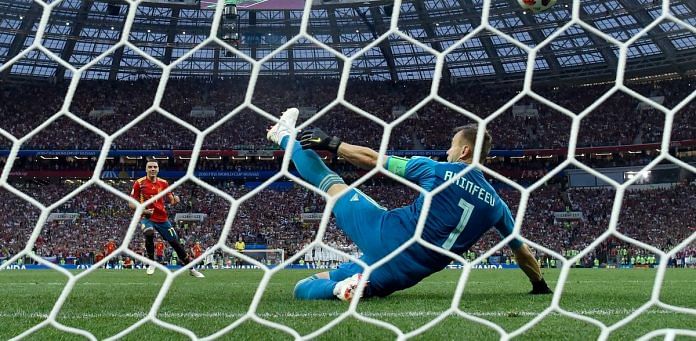The siege of Stalingrad during World War II is one of the fiercest battles in contemporary history, and a tide-turner in many ways.
Defence of the motherland rested on the shoulders of a city surrounded by the enemy. Back then, Stalingrad was all that stood between defence of ‘mother’ Russia and victory for fascism. Forward to 2018, and the defence of ‘mother’ Russia now rested on 11 players in white, defending the 18-yard box as though their lives depended on it.
Back then, Russians had given their lives to defend the motherland, and now the same strategy was employed to outwit a similarly superior opponent. Albeit, this time, no lives were at stake, but a lot more.
Football is really an extension of life and politics but played out on a 130-by-100 yard pitch. All emotions and expectations are met on the green grass turf. Miracles also happen on this pitch as Istanbul witnessed in the Champions League final of 2005 when Liverpool came back from behind to defeat Milan.
National traits determine the approach to politics as it does to a football match. Marshal Georgy Zhukov understood it well 75 years ago, but at an enormous cost. Stanislav Cherchesov, the coach of the Russian national team, used the same national character and traits to his country’s benefit on 1 July 2018, in Luzhniki stadium in Moscow.
The siege of Stalingrad during World War II is one of the fiercest battles in contemporary history, and a tide-turner in many ways. The troops deployed, number of armour and aircraft, and the casualty figures produce staggering statistics. An expanding fascist Germany and its allies laid siege to Stalingrad from 23 August 1942 to 2 February 1943.
With copybook military planning, Germany, the attacker, was manned and equipped in vastly superior ways. But what the Russians had was a resolve, a fierce unwillingness to give in. And, they had the national trait to draw the attackers in, wait out, and grind them to a slow agonising defeat, street by street.
Cherchesov did just that in Luzhniki Stadium, turning the lowest-ranked team at the World Cup into a giant-killer. In FIFA rankings, Spain is 10th and Russia 70th. Geographically, between the two countries lie Cape Verde Islands and Burkina Faso, and both out-rank Russia. Just as the battle of Stalingrad produced statistics that are staggering, still recounted in military education worldwide, the Russia-Spain match has generated its own set of statistics that tell a tale. It’s the story of a touch too far.
Spain had a mind-boggling 75 per cent ball possession, clearly dominating the pitch. The German-led forces had a similar domination of territory, bottling in the city’s defenders.
Spain had an incredible 25 attempts on goal as against six by Russia, forcing Igor Akinfeev, the Russian goalkeeper and later the man of the match, to make nine saves compared to none by David de Gea, his Spanish counterpart.
Spain made 1,137 passes compared to Russia’s 284 – such is the contrast between the two teams in terms of capabilities. Place this in the context of artillery, armour and air assaults on Stalingrad 75 years ago. The Russian defenders hunkered down, waiting for their moment to strike. On Sunday, the defenders at Luzhniki Stadium used the same tactics, and waited.
The Russian game plan from whistle-to-whistle was to wait and wear the Spanish team down. The strategic objective was to take the game to penalties, just as Marshal Zhukov’s aim was to draw the German forces into the streets of Stalingrad — patience being the paramount virtue in both cases.
As any military commander will admit, once the bugle is sounded, all that remains of the plan is the strategic objective.
Fairly early in the game an own goal by Sergei Ignashevich put the plans to test until lady luck entered the fray, just as she did in the defence of ‘mother’ Russian in Stalingrad.
The most astonishing statistic from the match tells a different tale, and can be clearly pictured through the Stalingrad prism. Despite all the possession, the shots, the attempts and the saves, the Spanish team covered less distance compared to the Russians.
The Russians worked their socks off while defending their goal and harrowing Spain. The streets of Stalingrad were defended similarly – snipers and infantrymen darting here and there, harassing the Germans into submission.
In 2018, the harassment continued till the penalties, which, as any sports psychologists will testify, can be best converted into success when the mind is at peace.
Spain had been unhinged by Russian tactics, and the latter’s strategic objective prevailed against all odds. Stalingrad revisited.
Endnote: Among Germany’s fascist allies in the siege of Stalingrad was Croatia. And on 7 July 2018, Russia plays Croatia for a semifinal berth!
Manvendra Singh is BJP MLA and president of the Rajasthan Football Association




Really good piece sir,keep writing 🙂
An extraordinary piece. My hearty congratulations to Manvendra Singh ji for coming up with such a gripping and enchanting narrative. At the end of the story, he mentioned Croatia being the German ally during the Stalingrad seige. Is that any indicator of which way the game is going to go? Will Russia win the coming match against with their strong defense capabilities once patience? This article has some mystic trappings!